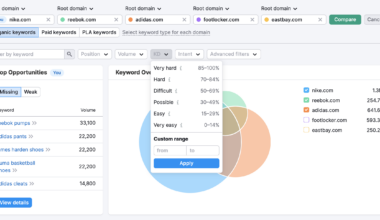Introduction
As a website owner, you might have heard about the importance of HTTPS for SEO. But what exactly is HTTPS, and how does it impact your website’s search engine rankings? In this article, we will explore the significance of HTTPS for SEO and the benefits of implementing it on your website.
If you are not familiar with the term HTTPS, it stands for Hypertext Transfer Protocol Secure. It is a protocol that encrypts the data transmitted between the website and the user’s device, ensuring that the information is secure and cannot be intercepted by a third party. HTTPS is the secured version of HTTP, the standard protocol used to transfer data on the web.
Google has been advocating for a secure web for years, and there are several reasons why HTTPS is crucial for SEO. The search engine considers website security as a ranking factor, meaning that websites with HTTPS are more likely to rank higher in search results than non-secure sites.
In addition to improving your website’s search engine rankings, implementing HTTPS has several benefits for website owners. It provides increased credibility to your website, ensuring that users trust your brand and are more likely to engage with your content. HTTPS also protects your website from cyber attacks, such as phishing, malware, and hacking.
Now that we’ve covered the basics of HTTPS and its impact on SEO let’s explore the benefits of implementing HTTPS on your website.
What is HTTPS?
HTTPS is an advanced version of HTTP (Hypertext Transfer Protocol) that encrypts the data transmitted between the website and user’s device. In simpler terms, HTTPS ensures that the information shared between you and the website is secure and cannot be intercepted by a third party.
The encryption process involves the use of SSL (Secure Sockets Layer) or TLS (Transport Layer Security) certificates. These certificates establish a secure connection between the website and the user’s device, thereby protecting the data from being intercepted or modified.
HTTPS is denoted by a padlock icon in the address bar of the browser, and the URL starts with “https://” instead of “http://”. This padlock symbol and the “https” in the URL indicate that the website is secure, and the data transmitted is encrypted.
In the past, HTTPS was primarily used for e-commerce and banking websites that dealt with sensitive information such as credit card details, login credentials, and personal information. However, with the increasing awareness of online privacy and security, HTTPS has become a standard protocol for all websites.
Google has been actively promoting HTTPS, and since 2014, it has been using HTTPS as a ranking signal. This means that websites that have implemented HTTPS are more likely to rank higher in search results than non-secure sites. Moreover, Google Chrome, the world’s most popular browser, has started to mark all non-HTTPS websites as “Not Secure,” creating a sense of urgency for website owners to switch to HTTPS.
In the next section, we will explore the impact of HTTPS on SEO and how it can benefit website owners.
The Impact of HTTPS on SEO
The impact of HTTPS on SEO cannot be overstated. Google has been pushing for a secure web for years, and since 2014, it has been using HTTPS as a ranking signal. This means that websites that have implemented HTTPS are more likely to rank higher in search results than non-secure sites. Here are some of the ways in which HTTPS impacts SEO:
1. Improved Rankings: Websites that have implemented HTTPS are more likely to rank higher in search results than non-secure sites. This is because Google considers website security as a ranking factor, and HTTPS provides an additional layer of security to your website.
2. Trust and Credibility: Implementing HTTPS on your website provides increased credibility to your brand. Users are more likely to trust a website that is secure and has a padlock symbol in the address bar. This, in turn, leads to increased engagement and conversions.
3. Referral Data: Non-secure sites do not pass referral data to secure sites, meaning that website owners cannot track the source of their traffic accurately. This can lead to inaccurate data and analytics. However, with HTTPS, referral data is passed securely, ensuring that website owners can track their traffic sources accurately.
4. User Experience: HTTPS provides a better user experience as it ensures that the data transmitted between the website and user’s device is secure. This creates a sense of trust and confidence in the user, leading to increased engagement and conversions.
In conclusion, implementing HTTPS on your website is crucial for SEO. It not only improves your website’s search engine rankings but also provides increased credibility, trust, and security to your brand. Moreover, with Google Chrome marking all non-HTTPS websites as “Not Secure,” it has become imperative for website owners to switch to HTTPS. In the next section, we will explore how to implement HTTPS on your website.
The Benefits of HTTPS for Website Owners
Implementing HTTPS on your website provides several benefits for website owners. Let’s take a look at some of the advantages of switching to HTTPS:
1. Improved Security: The primary benefit of implementing HTTPS is improved security. HTTPS encrypts the data transmitted between the website and user’s device, ensuring that it cannot be intercepted or modified by a third party. This protects your website from cyber attacks, such as phishing, malware, and hacking, and provides a secure environment for your users.
2. Increased Credibility and Trust: HTTPS provides increased credibility and trust to your brand. Users are more likely to trust a website that is secure and has a padlock symbol in the address bar. This, in turn, leads to increased engagement and conversions. Moreover, with Google Chrome marking all non-HTTPS websites as “Not Secure,” it has become imperative for website owners to switch to HTTPS to maintain their credibility and trustworthiness.
3. Better SEO Rankings: As we discussed earlier, Google considers website security as a ranking factor, and HTTPS provides an additional layer of security to your website. Websites that have implemented HTTPS are more likely to rank higher in search results than non-secure sites. Moreover, HTTPS also passes referral data securely, ensuring that website owners can track their traffic sources accurately.
4. Improved Website Performance: HTTPS can improve your website’s performance by reducing the load time of your website. This is because HTTPS uses the latest protocols and technologies that optimize the performance of your website. Moreover, with the increasing use of mobile devices to access websites, HTTPS can provide a faster and more secure experience to your mobile users.
5. Compliance with Regulations: Many regulations, such as the General Data Protection Regulation (GDPR), require websites to implement HTTPS to protect their users’ data. Implementing HTTPS ensures that your website is compliant with these regulations and protects your users’ data from unauthorized access.
In conclusion, implementing HTTPS on your website provides several benefits for website owners. It improves your website’s security, credibility, and SEO rankings, while also providing a faster and more secure experience to your users. Moreover, with the increasing importance of online privacy and security, implementing HTTPS has become a standard protocol for all websites. In the next section, we will explore how to implement HTTPS on your website.
Implementing HTTPS on Your Website
Now that you understand the importance of HTTPS for SEO and the benefits it provides, let’s explore how to implement HTTPS on your website. Here are the steps to follow:
1. Get an SSL/TLS Certificate: The first step in implementing HTTPS is to get an SSL/TLS certificate. You can obtain this certificate from a trusted Certificate Authority (CA) such as Let’s Encrypt, Comodo, or Symantec. Some web hosting providers also offer SSL certificates for free or at a minimal cost.
2. Install the Certificate: Once you have obtained the SSL/TLS certificate, you need to install it on your web server. The installation process varies depending on the web server software you are using. You can find detailed instructions on how to install SSL certificates on popular web servers such as Apache, Nginx, and IIS on the website of the certificate authority or your web hosting provider.
3. Update Links and URLs: Once the certificate is installed, you need to update all the links and URLs on your website to use the “https://” protocol instead of “http://”. This includes updating internal links, external links, and references to external resources such as images, scripts, and stylesheets.
4. Redirect HTTP to HTTPS: After updating the links and URLs, you need to redirect all HTTP requests to HTTPS. This ensures that even if a user types “http://” in the address bar, they will be automatically redirected to the secure “https://” version.
5. Test and Verify: After implementing HTTPS, you need to test and verify that everything is working correctly. You can use online tools such as SSL Checker and Qualys SSL Labs to check the SSL configuration and identify any issues.
6. Monitor and Maintain: Finally, you need to monitor and maintain your HTTPS configuration to ensure that it remains secure and up-to-date. This includes renewing the SSL/TLS certificate before it expires, updating the web server software and security patches, and monitoring the SSL logs for any suspicious activity.
In conclusion, implementing HTTPS on your website is essential for SEO and provides several benefits for website owners. By following the above steps, you can ensure that your website is secure, credible, and compliant with regulations. Moreover, with Google Chrome marking all non-HTTPS websites as “Not Secure,” it has become imperative for website owners to switch to HTTPS to maintain their search engine rankings and user trust.
Final Thought
In conclusion, the importance of HTTPS for SEO cannot be overstated. Google considers website security as a ranking factor, and implementing HTTPS provides an additional layer of security to your website. Moreover, HTTPS provides increased credibility, trust, and security to your brand, leading to increased engagement and conversions.
Implementing HTTPS on your website may seem like a daunting task, but it is essential for the security and credibility of your brand. The benefits of implementing HTTPS, such as improved SEO rankings, increased user trust, and compliance with regulations, far outweigh the initial effort and cost of implementation.
As website owners, it is our responsibility to ensure the security and privacy of our users’ data. Implementing HTTPS is a vital step in achieving this goal and creating a safe and secure online environment for our users.
So, if you haven’t already, it’s time to switch to HTTPS and secure your website. Follow the steps outlined in this article to implement HTTPS on your website, and enjoy the benefits of a secure and credible online presence.






















